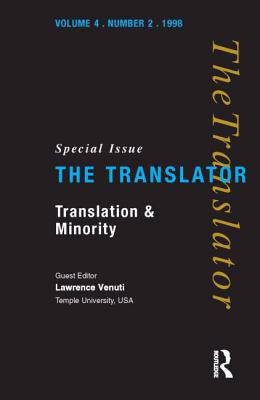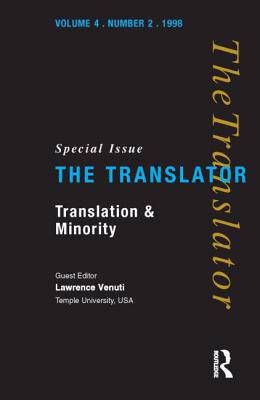
- Retrait gratuit dans votre magasin Club
- 7.000.000 titres dans notre catalogue
- Payer en toute sécurité
- Toujours un magasin près de chez vous
- Retrait gratuit dans votre magasin Club
- 7.000.0000 titres dans notre catalogue
- Payer en toute sécurité
- Toujours un magasin près de chez vous
Description
The premise of this volume is a question: What can the concept of minority bring to the practice and study of translation? Minority is understood here to mean a cultural or political position that is subordinate, whether the social context that so defines it is local, national or global. This position is occupied by languages and literatures that lack prestige or authority, the non-standard and the non-canonical, what is not spoken or read much by a hegemonic culture. Yet minorities also include the nations and social groups that are affiliated with these languages and literatures, the politically weak or underrepresented, the colonized and the disenfranchised, the exploited and the stigmatized.
Translation today is itself a minor use of language, a lesser art, an invisible craft that commands less cultural capital and fewer legal privileges than original composition. Yet the focus in this collection is not on what translators worldwide have in common but on the distinctive forms that translating takes when it is done by or on behalf of minorities. The articles in this volume present a variety of case studies that illuminate the linguistic and cultural problems posed by such translating, as well as the economic and political agendas it has served. Together, these pieces show that the concept of minority is worth exploring because it inspires innovation in translation practice and research. Minor cultures are coincident with new translation strategies, new translation theories, and new syntheses of the diverse methodologies that constitute the discipline of translation studies.
Spécifications
Parties prenantes
- Editeur:
Contenu
- Nombre de pages :
- 256
- Langue:
- Anglais
- Collection :
Caractéristiques
- EAN:
- 9781900650106
- Date de parution :
- 18-11-98
- Format:
- Livre broché
- Format numérique:
- Trade paperback (VS)
- Dimensions :
- 152 mm x 229 mm
- Poids :
- 385 g

Les avis
Nous publions uniquement les avis qui respectent les conditions requises. Consultez nos conditions pour les avis.





